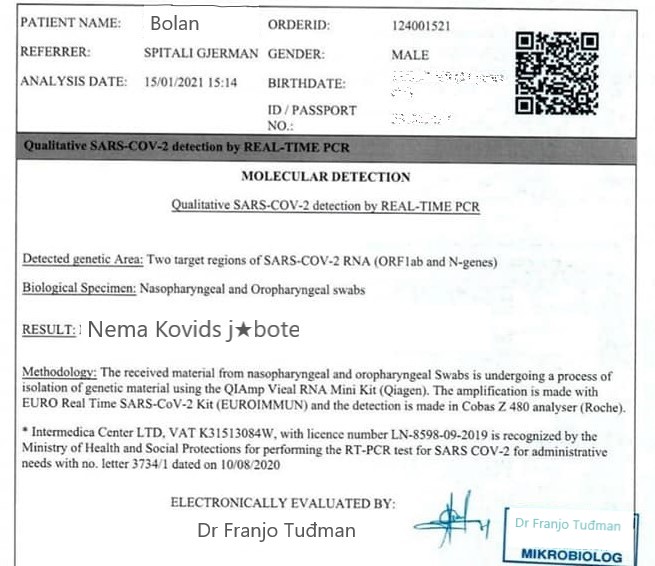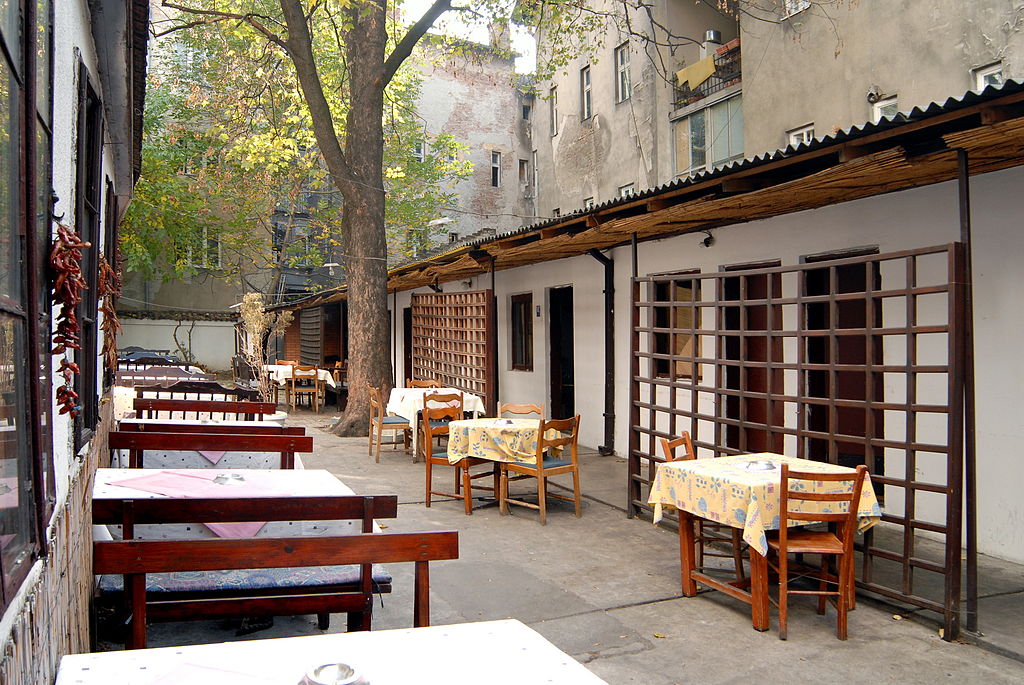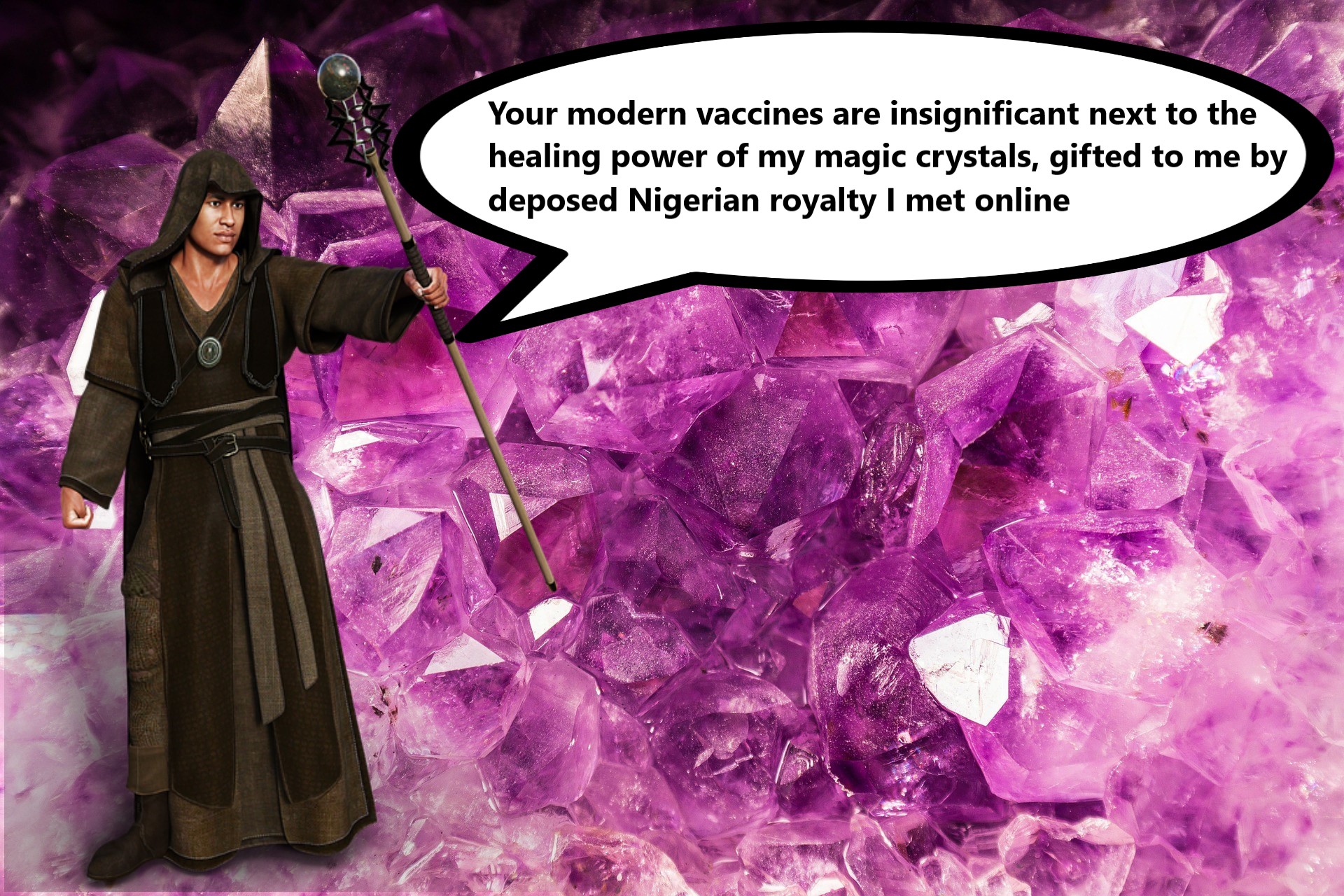Ombudswoman Calls for Prompt Publication of Mandatory COVID Certificates
ZAGREB, 12 Nov - Ombudswoman Tena Šimonović Einwalter on Thursday called on the government and the national COVID-19 response team to urgently publish their decision on mandatory COVID certificates considering that it should go into force in a few days and that its text and details of its implementation are unknown.
"The information is necessary to bodies and institutions so they can implement the decision, to their employees who must comply with it as well as to citizens whose many rights depend on their physical appearance at those places. The Ombudswoman has therefore recommended that the decision be urgently published, with complete and clear instructions regarding its implementation," the Office of the Ombudswoman said on its website, giving recommendations regarding the expansion of the use of the certificate to the entire government and public sector.
"The introduction of this measure has led to an increase in vaccination interest and that requires a faster and better response since we are witnessing queuing for vaccination. Citizens waiting to get vaccinated, however, will not be able to obtain a COVID-19 certificate right away and they will have to get tested in the coming period," Šimonović Einwalter noted, adding that it was necessary to make vaccination and testing broadly available as well as explain to citizens how they can exercise their rights before bodies of public authority until they meet conditions to obtain the certificate.
She warned about the need to ensure, at least during the transitional period, free testing for destitute citizens as well as those who cannot get vaccinated due to medical reasons.
The purpose of the recommendations is to contribute to the readiness of the system to implement the announced decision, the ombudswoman said, recalling that it was necessary to make sure the restriction of citizens' rights was proportional to the desired outcome - prevention of a further increase in the number of infections and deaths and alleviating the pressure on the health system by a growing number of patients requiring hospital treatment.
For more on politics, CLICK HERE.
Croatia Logs 1,517 New COVID-19 Cases, 10 Deaths
ZAGREB, 1 Oct 2021 - Croatia has registered 1,517 new coronavirus cases and 10 COVID-19-related deaths in the last 24 hours, the national coronavirus response team reported on Friday.
The number of active cases now stands at 8,990, and 738 infected persons are receiving hospital treatment, including 99 who are on ventilators.
Since 25 February 2020, when the first case was confirmed in Croatia, 406,307 people have been registered as having contracted the novel virus, of whom 8,650 have died and 388,667 have recovered, including 1,392 in the last 24 hours. 23,044 people are currently self-isolating.
To date, 2,833,156 people have been tested for the virus, including 10,126 in the last 24 hours.
A total of 3,436,799 doses of vaccines have been administered, with 44.92 percent of the total population, or 53.89 percent of adults, having been vaccinated. 1,822,966 people have received at least one dose and 1,709,647 have been fully vaccinated, which makes up 50.62 percent of the adult population.
For more news, CLICK HERE.
System of Digital COVID-19 Certificates Operational, Says PM Andrej Plenković
ZAGREB, 1 June, 2021 (Hina) - Prime Minister Andrej Plenković said in the parliament on Tuesday that the system of digital COVID-19 certificates was operational and that certificates could be obtained via the e-citizen system.
"Digital COVID certificates are here, they exist and can already be used," he said, showing MPs a paper copy of his certificate.
"The EU digital certificates goes into force in a month, the government has made a decision on the national mechanism for the issuing of certificates and I have obtained a certificate about having been vaccinated through the e-citizen system," he said, calling on MPs to do the same.
Plenković said that there was more than enough vaccine for all citizens as well as for countries with lower supplies, and that vaccination was now faster than before.
Responding to MPs' remarks, he said that the national coronavirus management team would make a decision that would make it possible also for people who had received one vaccine shot to enter Croatia 22 days after vaccination.
In a debate about an opposition motion for a vote of no-confidence in Health Minister Vili Beroš, Plenković dismissed the Opposition's claims that at one point patients could not obtain medicines and that the health system did not function.
"That's a lie, at no time were people left without medicines, the health system was never at breaking point, there was never a shortage of beds or ventilators and no medical service was ever unavailable," he said.
Health Minister Beroš told MPs that he was working on the problem of the health system's debts to drug wholesalers and that a projection of payment in the period until the end of the year had been made.
He also announced the relaunching of the Institute of Immunology, including for the production of viral vaccines.
For more about Covid-19 in Croatia, follow TCN's dedicated page.
Lawmakers Divided Over COVID Certificates
ZAGREB, 21 May 2021 - After the European Parliament, Council of the EU chair Portugal and the European Commission approved the COVID-19 certificate, intended to help summer tourism in the EU, the Croatian Sabor on Friday expressed dissenting opinions, from support to warnings that this was a discriminatory decision.
Social Democratic Party MP Arsen Bauk told reporters that SDP's MEPs had supported embarking on an agreement with the European Council with regard to COVID-passports and that the party supports them in the Croatian parliament too if they will facilitate travel and getting back to normal.
"Naturally, we are aware of the dangers of them being a means of discrimination and we will observe that solution with caution, as we did with the (COVID-19) measures, but in principle, we support the idea," he said, adding that the reference to discrimination was in the sense that the certificate serves to diminish someone's rights.
We're aware of that danger and that is why we will take care that that does not happen. We consider that that is primarily a document that facilitates life for citizens and only possibly something that discriminates, Bauk underscored.
If there are contentious things, such as protection of personal information, they are less than the benefits that the certificate can bring for a normal life for citizens, he added.
Marija Selak Raspudić (Bridge) underscored that until there is an equal approach for all EU countries to all three conditions that are set as essential to be issued with the certificates, and considering that Croatia has a low inoculation rate, that decision is discriminatory as it does not put all EU member states in an equal position.
It is also contentious, she added, how long that decision will apply and how it will apply to people who have been vaccinated with vaccines that have not been approved by the EU, which means that some EU citizens will not have the same rights as other EU citizens.
Stjepo Bartulica (Homeland Movement) said that it is necessary to warn that the COVID certificates could pose a threat to fundamental freedoms and rights.
For more about politics in Croatia, follow TCN's dedicated page.
PM Says COVID Travel Pass Important for Croatia as a Tourist Destination
ZAGREB, 21 May 2021 - Agreement on introducing an EU-wide COVID travel pass was welcomed by Croatian Prime Minister Andrej Plenković on Friday, who said that Croatia strongly pushed for the agreement on this document designed to facilitate free movement for work and tourism across the bloc.
The European Parliament confirmed on Thursday that a deal had been reached between the EP, Portugal which is the current chair of the Council of the EU and the European Commission on EU Digital COVID certificate the travel pass with the EU's 27 member states.
The certificate will include information about vaccination, tests, and recovery from the disease. EU citizens will be able to obtain the pass if they have, at least, one of the three elements.
The official name of the travel pass will be "EU Digital COVID certificate" and it will have a physical and digital version and will work through a QR code.
Applying those certificates is very important for Croatia, notably for its tourist trade, Plenković said today in Osijek.
The regulation about certificates is set to take effect in early July.
Plenković said that the COVID-19 epidemic was slowly ebbing away in Croatia.
He said that Croatia was ready to handle the technical processing of the data concerning the recovery, vaccination, and negative tests.
Those with one vaccine dose will be able to apply for the pass. But only vaccines approved by the European Medicines Agency (EMA) will be accepted. As of today, the vaccines green-lighted by the European Medicines Agency are Pfizer-BioNTech, Moderna, AstraZeneca, and Janssen (Johnson & Johnson).
For all you need to know about coronavirus specific to Croatia, including travel, border and quarantine rules, as well as the locations of testing centres and vaccination points up and down the country, make sure to bookmark our dedicated COVID-19 section and select your preferred language.
45 People With Fake PCR Tests Detained At Croatian Border In One Weekend
January 19, 2021 – 45 people tried to enter Croatia with fake PCR tests this weekend alone. They were caught by Croatian police, detained at the border and reported to the State's Attorney office. If found guilty, each faces a maximum penalty of three years in prison
Some 45 people tried to enter Croatia through the borders of one county with fake PCR tests this past weekend.
Travel from Bosnia and Herzegovina into Croatia currently requires the production of a negative PCR test or a doctor's certificate proving you have successfully passed through a COVID-19 infection in recent months.
Since the ban on entering Croatia from Bosnia and Herzegovina without a negative PCR test was introduced, fake PCR tests are increasingly being forged. Border police and customs officers at crossings in Brod-Posavina County have met many people trying to cross the border with fake PCR tests. But, this weekend a new record number of forged tests were found on the county's border crossings.
According to a statement from the Brod-Posavina Police Department, as many as 45 attempts to enter the country with fake PCR tests were discovered on Saturday and Sunday.
"At the Stara Gradiška border crossing, police officers determined that 43 persons, mostly citizens of Bosnia and Herzegovina, presented fake PCR tests issued in BiH at the border control. At the Slavonski Brod border crossing, two people were registered who gave forged tests," the Brod-Posavina police reported.
Police officers file criminal charges against all those suspected of committing the criminal offence of forgery of a document with the Municipal State Attorney's Office in Slavonski Brod. If found guilty, such persons face up to three years in prison.
The overall number of people detained on Croatia's border with fake PCR tests this weekend could actually be higher - the figures of 45 persons detained with fake PCR tests were released by the police of just one county in Croatia - Brod-Posavina County. A further eight Croatian counties exist along the border with Bosnia and Herzegovina. Each has border crossings between the two countries.
What Kind of Life Awaits Croatian Anti-Vaxxers Who Refuse Vaccination?
December 29, 2020 – The arrival of COVID-19 vaccines in Croatia has been met with much relief by many people. But, not everyone is happy. Conspiracy theorists - those who favour disreputable sources and 'whispers on the wind' to real science - are reticent, some even angry. So, what kind of life awaits Croatian anti-vaxxers who refuse to take the vaccine?
The people who inhabit the lands now known as Croatia have a long history of being pushed around. For this, they cannot be blamed. Greatly outnumbered by the occupying armies of some of the most powerful empires of all time - the Romans, Venetians, Austro-Hungarians and Ottomans - their rebellions against such overlords have been relatively small in number. Their default setting has been to visit the kafana at the end of the day and moan, grumble, gossip - perhaps even plot - against those who make their lives disagreeable.
Croatia was finally freed of its last imposing masters over two decades ago. But, true to form, the grumbling in the kafanas has continued. Except, now that the kafanas are all closed in response to Coronavirus, the moaning has moved almost exclusively to the internet. And, it has reached a shrieking pitch.
The arrival of COVID-19 vaccines in Croatia has been met with much relief by many Croatians. The news of the first vaccinated citizen, followed by the first vaccinated healthcare workers, was also well received. You can tell this from the overwhelmingly large amount of 'likes' such news generates when posted to social media. These warm welcomers of good news in Croatia could be best described as the silent majority. And, in the same way most Croatians lay subdued for lifetimes under bullying empires, this silent, sensible majority is drowned out by the deafening vitriol of the unhinged within the comments sections underneath.
These arch-moaners appear in the comments on most issues, railing against the increasingly modern ways of the world. On the issue of Coronavirus and the incoming vaccines, it is the Croatian anti-vaxxers who are angrily dominating the discourse.
It appears near pointless to debate with them. They are not ones for science, facts nor reasonable debate. Not for them are the reports of scientific journals, the BBC, The New York Times, The Guardian, Al Jazeera, or The Washington Post. Instead, they cite the most spurious of sources – a website nobody else has heard of, a document written by a friendless doctor from the Texas farming community who has a curiously photoshopped profile picture, a Youtube video made for the same price as a hamburger and narrated by a 17-year-old from the outside toilet. There's no point telling them that the vaccines coming onto the market were actually designed back on January 13, just two days after the Coronavirus genetic sequence had been made public and that it has taken until now to produce them, due to stringent testing on their safety. No. Because for Croatian anti-vaxxers, whispers on the wind, the horoscopes, crystal ball of the fortune-teller and the inescapable stare of Braco are just as reliable - if they're telling you what you want to believe. For whichever lunatic theory you want to adopt, you can look online and you'll be sure to find some crackpot to back it up. The internet is the great leveller for Croatian anti-vaxxers as well as everywhere else - a place where deposed Nigerian royalty who want to put money in your bank account have just as much credence as an 80-year-old media title with a blemishless reputation.
Of course, while life is too short to even debate with anti-vaxxers in Croatia or anywhere else, that's not to say they are undeserving of sympathy. In our recent interview with a doctor working on the Coronavirus frontline in a Croatian hospital, they generously raised an interesting defence of the tin-foil hat brigade - “It's not always the content of the conspiracy theory that appeals to these people as much as it is their inability to accept facts – the truth – because they have little faith in the authorities that are telling them.”
Finding fault in authorities is far from unique to Croatia. Yes, there is a certain amount of kafana moaning and grumbling all over the world, and often for good reason. Politicians are more than aware of this. And, in an era of widespread voter apathy and low voter turnout, where yet another silent majority has the potential so easily to change the names of those who govern, this is exactly why politicians will abstain from making the Coronavirus vaccines mandatory. With things as they currently stand, it is near inconceivable that Coronavirus vaccines will be made compulsory in Croatia or in any other western democracy. Good news for Croatian anti-vaxxers? Well, not quite, because it is highly likely that the private sector will be among the greatest of persuaders for vaccination. It is not unthinkable that we are about to enter a wholly new two-tiered society – the vaccinated and the unvaccinated. And signs of what that life might look like for Croatian anti-vaxxers are not good. They are not good at all.
“Vaccination could become one of the measures that would make it possible to come to events,” Stefan Breitenmoser, general manager of the Professional Association of Swiss Organizers of Concerts, Events and Festivals, told Sonntags Blick in the past week. In Switzerland, vaccination began on Wednesday and it is free. It is not only the entertainment events industry that is considering the measure - the Swiss Football League similarly said it is giving it serious consideration. Professional sports and the events industry have lost billions during the pandemic. The 2021 Olympics hangs on a knife-edge in regards to accepting audiences into its stadiums – it has already been delayed by a year. It is highly conceivable that access to all large events in future will be dependent on proof of vaccination. The National Stadium in Japan was due to host some of the key events of the 2020 Summer Olympics. The whole event has been delayed until summer 2021, in response to the pandemic © Arne Müseler
The National Stadium in Japan was due to host some of the key events of the 2020 Summer Olympics. The whole event has been delayed until summer 2021, in response to the pandemic © Arne Müseler
In an interview on N1 television in Croatia over recent days, epidemiologist Branko Kolarić - a member of the Scientific Council of the Government of the Republic of Croatia - echoed similar thinking. He stated that a list of the vaccinated will be carefully maintained, most likely through some kind of e-documents, and although vaccination will not be mandatory, vaccination will bring some benefits - such as air travel, group gatherings and attendance of concerts and festivals. You are surely not going to see police or soldiers checking your vaccination status at the entry to a dance music festival in Dalmatia. But, it is highly likely that event organisers will insist on proof of vaccination before granting entry. Even if they don't wish to, it is more than conceivable that they would not be granted the necessary licenses nor insurance without assuming such a position.
Another industry that has lost billions in the pandemic is the travel and tourism sector. Little surprise then to have found budget airline Ryanair launching a new campaign of 'Jab and go' over the last few days. The suggestion is crystal clear – get vaccinated, you can come on our planes, we'll allow you to travel. Ryanair will certainly not be the last airline to assume responsibility for vetting passengers' vaccination status. Croatian anti-vaxxers had better be really happy to be here, because international borders may well be permanently closed for them while they remain unvaccinated.
So, a life with no spectating at big sports events, no more large concerts or music festivals and no more international travel is what seems to be just around the corner for Croatian anti-vaxxers. Sounds harsh, unpleasant. But what if it extends to libraries, schools or even hospitals? We don't yet know anything concrete about the lower tier of existence Croatian anti-vaxxers may choose to dwell in. But, it's not where I want to live. Perhaps they'll even be forced to drink exclusively in their own anti-vaxxer kafanas? For sure they'll be easy to identify – they'll be the ones from which the loudest moans are coming.
The views expressed in this article are solely those of the author and are not necessarily shared by Total Croatia News
EU Ministers Meet: COVID-19 Passport, Cro Card and More
European Union ministers have met to discuss the state of European tourism, and a document, known as the COVID-19 passport, that would be valid for all EU countries, was discussed. Croatian Tourism Minister Gari Cappelli discussed the issue after a video conference of EU tourism ministers on the state of European tourism, the impact of the coronavirus pandemic and the measures and conditions for tourist arrivals.
As Poslovni Dnevnik writes on the 28th of April, 2020, such a document, which some have dubbed the COVID-19 passport, refers to the health and safety part of the travel protocol, HRT reported.
Cappelli also said that it has been agreed that there should be a common plan in place to overcome the coronavirus crisis, regardless of individual countries and their respective stances.
Tourism accounts for 10 to 11 percent of the EU's GDP and employs 12 percent of its total staff.
Cappelli also said that things were made very clear about the short-term recovery fund. In the budget until 2027, tourism wasn't as prominent in the first package, but in view of coronavirus, this situation is completely changing, the united view of all countries is that for tourism, we'll have to make a big step forward in the budget.
''Tourism is the key to strengthening, that is, saving national economies,'' Cappelli said, citing examples of other countries which rely heavily on tourism in addition to Croatia, such as Italy, Spain and Greece.
Responding to a reporter's question about the possibility of establishing a tourist corridor, he hoped to reach an agreement on the matter by the end of May, if not in a common area, then bilaterally with interested countries partaking.
"We already have a respectable number of countries that are interested," Cappelli said.
Cappelli also said the Cro Card remains in the works.
''The Cro Card will be used only in Croatia, it will amount to 2500 kuna tax-free, and we'll see if we can do something extra in this area, we'll see if we get additional discounts,'' said Cappelli.
Asked by reporters whether there would be price adjustments for domestic tourists, Cappelli replied that the market would do its job and that part of the accommodation capacities in the country would respond and give some discounts.
Answering a journalist's question on whether entry would be allowed only to those who had acquired immunity, he replied that he would not go into detail on that, adding that we must first create a common protocol, so that the same rules apply on arrival and departure.
''All countries are working on preparing the document, we're all there together,'' said Cappelli.
On the eve of the meeting, Cappelli announced that he would also discuss the possibility of opening tourist routes and traffic as the relaxation of the anti-epidemic measures begin, including the issues of opening borders and country-specific initiatives on the so-called tourist bridges (for example, as suggested by the Czechs towards Croatia).
Tourism is the most affected sector in the coronavirus crisis and needs generous assistance within the European Union's long-term recovery plan, Internal Market Commissioner Thierry Breton said earlier. He added that EU-wide annual hotel and restaurant revenue could fall by at least 50 percent and cause losses for tour operators, cruise companies, travel agencies, airlines, which reach up to 70 percent.
The European Association of Travel Agencies and Tour Operators (ECTAA) has called on the European Commission and EU tourism ministers to step up their efforts and devise a more meaningful bailout package and a properly coordinated exit strategy for the tourism and travel industry from the coronavirus crisis.
For more on coronavirus and the COVID-19 passport as we get it, follow our dedicated section.


